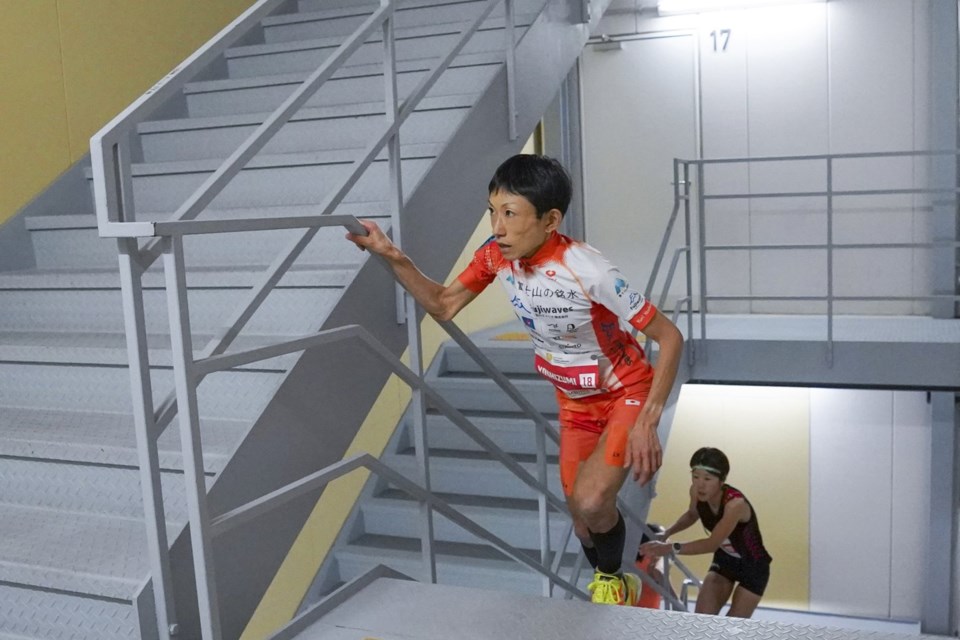TOKYO (AP) — If you're trying to lose weight and want a new way to do it, stair-climbing as a regular exercise — or just adding a few flights a day — might be for you.
It's accessible, and research shows it's more effective than walking on level ground.
"Overall, it is a fact that stair-climbing gets you fit faster and consumes more calories,” said Lauri van Houten, vice president of the International Skyrunning Federation, which oversees a wide range of disciplines that involve vertical climbing.
This includes disciplines like mountain running above 2,000 meters (about 6,500 feet) or events like the Stairclimbing World Championships.
These competitions are for the very fit, but we're talking here about adding a few minutes of stair-climbing as a daily routine and raising awareness about its effectiveness
“How many calories will I burn is the question everyone wants to know,” van Houten said. “Here’s the good news: The overall energy expenditure of the exercise depends on your weight. Therefore, the more you weigh, the more you burn.”
Stair-climbing burns calories — fast
Research shows you burn about 20 times more calories going up stairs than walking on flat ground. Even going down stairs you burn roughly five times more, the muscles being worked to slow the body’s descent.
That might be all you need to know if you are trying to lose weight.
Dr. Alberto Minetti, a physiologist and biomechanist at the University of Milan, has done extensive research of human locomotion — including stair-climbing.
“It is an exercise everybody can do,” Minetti told The Associated Press. “You always have stairs nearby you — free of charge compared to a gym.”
Minetti did the math to explain why going up stairs is so effective for burning calories in a short amount of time.
“To move 1 kilogram of body mass over 1 horizontal meter, you expend 0.5 calories,” he said. “If you move 1 kilogram of body mass vertically on stairs it’s 10 calories. So it’s 20 times the calories moving vertically rather than horizontally.”
Trained as a physician, Minetti has spent his career in research rather than treating patients. He suggested “watching your speed” for the not-so-young and beginners. He does his own stair-climbing at his third-floor residence in Milan. He said he often takes a few deep breaths before ascending, which makes him feel fresher at the top.
, Minetti makes the point that using the arms in stair-climbing adds extra power. Handrails offer safety, too.
The journal notes that handrails are available in most stairwells in skyscrapers, which maximizes “the muscle mass involved and, consequently, the mechanical/metabolic power of the ascent” by getting the arms involved.
“They are relatively small muscles in the arms, but better than nothing," Minetti said.
Stairs are everywhere
If stair-climbing was an Olympic sport, Suzy Walsham would own a handful of gold medals.
She's won 10 races up New York's Empire State Building — officially 1,576 stairs. She's claimed titles in more than 100 international stair races, and was once regarded as the No. 1 woman in the discipline.
Five times, the Australian has won climbs up the Eiffel Tower.
This was all too easy, apparently.
When she was living in Singapore, Walsham climbed up her 29-story building — 37 consecutive times. It took over four hours, riding the elevator down each time after reaching the top with short breaks for coffee or water. She covered a vertical distance of 3,200 meters (10,500 feet).
But let's get grounded. What are the advantages of stair-climbing as a regular exercise routine for the rest of us?
“You get a lot of bang for your buck,” Walsham told the AP. “Many people struggle to run as they age. The impact of running gets harder on the joints. But stair training is a great alternative.”
Stairs are everywhere — one flight, two flights at home, inside skyscrapers, in stadiums and arenas, at work, in shopping malls, in the subway.
One giant advantage of stair-climbing is it doesn't take much time. It's easy to build up, adding a few flights of stairs every day or week, and it improves balance.
On the down side, it's not very scenic, particularly in the stairways of towering skyscrapers.
Stair-climbing can be worked into your daily routine
Yuri Yoshizumi won last year's women's division of the Stairclimbing World Championships in her native Osaka, Japan, a 285-meter (935 feet) climb — 1,610 stairs — that she finished in 10 minutes, 20.06 seconds.
“Stair-climbing is an easy sport for beginners and the general public to get into,” Yoshizumi told the AP in an email. “Elite athletes push themselves pretty hard, so it's pretty tough. But it's good for you to strengthen your muscles and your cardiovascular system in a short amount of time.”
She added another advantage, particularly living in a large metropolis like Osaka.
"It's possible to do it in the city,” she said. “Just using the stairs instead of the escalators at (subway) stations and department stores is a good way to get some exercise.”
Stephen Wade, The Associated Press



